By purchasing controlling interest of the major American fossil fuel companies, the federal government can phase out fossil fuels, transition to sustainable energy, and enforce a lower price of oil which will alleviate inflationary pressures. Bob Pollin joins Paul Jay on theAnalysis.news.
TRANSCRIPT
Paul Jay
Hi, welcome to theAnalysis.news. I’m Paul Jay, and we’ll be back in just a few seconds with Bob Pollin. We’re going to talk about just where is [Joe] Biden’s climate agenda because, at the moment, it seems like it’s kind of nowhere. We’re also going to talk about inflation, and we’ll be back in just a few seconds. Please don’t forget there’s a donate button, a subscribe button, a share button, all the buttons. Be back in just a few seconds.
So it looks like ‘Build Back Better, Biden’s big infrastructure plan, which was supposed to include a major component that would deal with the climate change crisis. And while on this show, we’ve already talked about the inadequacies of that plan, it at least was something; it wasn’t anything. Well, now it might be getting back to almost nothing, given that Biden and the Democratic Party can’t get this passed. More or less because of a couple of members of their own party.
Bernie Sanders, recently in an interview with the Guardian newspaper, said the Democratic Party is abandoning the working class. When I just said this to our guest, Bob Pollin, he said, oh, what news? What news is that?
At any rate, now joining us to talk about all of that, but we’re going to start with the issue of inflation is Bob Pollin. Bob’s the Co-Founder of the PERI institute at the University of Massachusetts, Amherst. He’s a regular on theAnalysis.news. Thanks for joining me, Bob.
Bob Pollin
Very happy to be on, Paul. Thanks for having me.
Paul Jay
So a few months ago, we did an interview, and we talked about inflation. And we’re going to get into that. I do want to make just one comment first on the climate side, which is sort of the bigger issue. But we are going to start with inflation. Is the way the media keeps framing this issue of ‘Build Back Better’ not passing, and what’s going to happen? It’s all about the bad fortune and future of the Democratic Party. Well, this isn’t a great crisis for the Democratic Party. Maybe it is, but it’s a heck of a lot bigger crisis for humanity because as weak as the climate plan was, at least there was a conversation about a climate plan. Let’s do that big picture first, and then we’ll get into inflation.
Bob Pollin
Sure, well, by the way, the two things are interrelated as we talk about inflation. But, you know, the ‘Build Back Better’ program that Biden introduced, when was it? In March of last year, at about $3.4 trillion for everything. The climate was one part of it; it was about one-third, and then issues around child care support, support for home care, pharmaceutical prices, and so forth. That was in about the other two-thirds.
When we talked about it before, at $3.4 trillion, so if we say $1 trillion was for climate, roughly, and that’s over ten years. So that’s about $100 billion per year for government support for investments in climate. I could make an argument that that was barely adequate for lifting off into a real climate sustainable investment path. But now that we’re at half of that in terms of the overall program, at least as being discussed in Washington today. And that half, so that would be, let’s say, $50 billion for climate. And even that looks like it might not pass. On top of that, not only was their money involved investments in climate, there were regulations that were critical that would say utilities had to achieve the renewable portfolio standard, meaning they had to increase their share of renewable energy. That was regulatory. That was not money coming out of taxpayers’ pockets. It was a regulation. It was up to the utilities to figure out how to get there. That was a very powerful tool. But Senator [Joe] Manchin forced the elimination of that one way back. So we’re back in terms of these tax subsidies, it’s not nearly enough, and it’s probably not going to pass, at least as far as I can read, tea leaves.
Paul Jay
All right, well, we’re going to come back to the climate issue. Let’s move to inflation and then come back to climate. So last time we interviewed a few months ago, we talked about inflation, and the headline was ‘A little bit of inflation is not so bad. And you were arguing that a little bit of inflation, and you said most of the inflation that’s coming is really coming from energy prices. But if there’s a small effect of inflation that’s connected to the rise of workers’ wages, that’s not so bad. And then I got all kinds of emails. Why is Pollin saying inflation is not bad? Look at my cost of food. Well, your argument wasn’t dealing with it. You were saying if the inflation is from a little rise in wages, that the rise in wages is normally a little more than the rise of inflation. So that’s good, but we’ve seen a lot more than that. So where are we at, and how long do you think this is going to last?
Bob Pollin
So if we look at the most recent data that just came out this week, so overall, the broadest measure of inflation, the one that’s quoted is the consumer price index that showed us for the last year that prices went up by 7%, which is the highest rate of inflation since 1982. Okay, but if you break that down, there are really three big factors in inflation right now.
One is that wages have gone up so that the average costs of hiring a worker are up by about three and a half percent. So that’s about half of the increase in wages: half the increase, 7% increase in overall inflation. Wages have gone up, or business costs of labour have gone up by about 3.5%, so that’s half. But the other half is really only two things.
I just was looking at it right before we got on. One of them is used car prices, and the other is oil prices. If you add those three things up, oil prices, used car prices, wages, that explains the entire inflation. The wage part of it, it’s not distributed evenly. Not all workers’ wages have gone up equally, of course. The highest wage increases have been in foodservice and hospitality. And these are people, their wages, of course, went down, they were laid off, and now the wages have come back, and it’s hard to attract people.
Now the reason it’s hard to attract people is because there were such lousy jobs before, and they’re even worse jobs now because of COVID. They’re not safe. And the other wages that have gone up relatively fast are in healthcare and hospital workers. So they’re getting wage increases. They’re getting wage increases that are above the inflation rate. So that’s a positive. Now keep in mind, again, their wage increases are happening from a very low base, so they’re still lousy jobs. And that’s why you’re also seeing this phenomenon of people quitting their jobs. You have the highest quit rates in decades, maybe ever since the numbers have been measured. You’re seeing about 4% of the labour force quitting their jobs. So you have relatively low unemployment, you have high quit rates, you have wage increases happening for the lowest-paid workers. So those are all relatively positive developments, and it could be a lot worse. I mean, coming out of the recession, half of the labour force was laid off due to COVID at one point or another. So these are fairly positive developments. On the energy side, yeah, oil prices have gone up by 50% since last year.
Paul Jay
Bob, that overall inflation rate of 7%. But that doesn’t really get at the prices that ordinary working people are facing for daily life, because if I’m right, I’m just looking at these numbers here. Bureau of Labour Statistics from November, beef went up 24%, as you said, gasoline is up around 50%, but like natural gas is up 28%, bacon is up 20%, eggs are up 12%, and as you said, used cars are up 26%.
Bob Pollin
Right, so here’s, if I may, I’m looking at the same. I’m looking at, as of today, the consumer price index. So yeah, meat, poultry, fish, eggs are up 12.5%. So that’s higher than the 7%, but if you look, that’s less than 2% of the overall index. The big action oil is at almost 50%, and it’s 4.3% of the whole index. So that gives you an overall increase of 2.2%. Used cars, 37% increase, and that’s 3.4% of the overall index. That gets you to another 1.2%. So between oil and used cars, that gets you about 3.5% of the 7% overall index. And the other 3.5%, roughly, is equivalent to the wage or the labour cost increases. And that’s basically the story.
Paul Jay
But still, food is up around the 12% mark.
Paul Jay
Well, food, overall, I’m looking at is 6.3%. So food is less than the overall 7% increase. And of course, when we talk about food, one of the big factors in the production of food, as opposed to oil, labour is a much bigger component. So when the labour share is going up, that means that the food prices will go up also.
Paul Jay
Also, the cost of transportation is way up with fuel. So it comes back to a lot of it is fuel again.
Bob Pollin
Yes, fuel. Fuel and then we also have the business with the cars. And the cars are basically this supply chain shortage of computer chips semiconductors, and that’s what’s driving the automobile prices because they can’t produce new cars fast enough. So if you had to boil it down, it’s really computer chips making it hard to build cars. It is oil prices through the roof, and it is something that is a favourable development in general, which is wages going up.
Paul Jay
So if you take these two things, what can be done? Now, the semiconductor shortage, if I understand it correctly, it’s mostly because American companies, including Intel, decided it was just cheaper to offshore the production to Taiwan and then South Korea. And so, in order to save money on wages, they created this crazy global supply chain that, with the pandemic, they didn’t know how many chips to make. They didn’t know how long there’d be a recession. And now, everybody’s competing to quickly try to create new semiconductor manufacturing, but it’s very complicated.
My understanding is there’s one major company in the Netherlands that makes all the machines that make semiconductors, and they have a very limited capacity. So it’s at least five years to put up some new semiconductor capacity outside of Taiwan and South Korea. And then, of course, Taiwan’s caught in all the controversy with China, and China also buys semiconductors from Taiwan. So the semiconductor thing is a mess, which is part of this whole irrational, chaotic, global capitalist system.
Bob Pollin
So I read an interesting article the other day about Tesla, which does not have a supply shortage. And the reason they don’t have a supply shortage is in developing the software for their cars. They kept in-house their software design so that when the semiconductor shortage emerged, they simply rewrote the programs so that it wouldn’t entail the same amount of semiconductors as computer chips. They were able to reduce significantly the number of computer chips simply by rewriting the program. Whereas the other major auto manufacturers had outsourced all of this, and so, they have no capacity to rewrite their software to run the cars. So that’s why Tesla, as you know, Tesla, their market value is now what, $2.5 trillion or something like that. So they are totally outpacing all the other car companies because of the way they have maintained in-house capacity capability in writing software.
Paul Jay
Well, there’s nothing the Biden administration in any short-term way is going to be able to do anything about the semiconductor situation. Is there anything they can do about the cost of oil?
Bob Pollin
Well, here’s what I’ve been thinking. On the one hand, we have this severe problem of inflation tied largely with the cost of oil. On the other hand, when we switch and talk about climate, we want people to consume less fossil fuels. And therefore, one of the proposals has been out there, which is to tax fossil fuels, to tax carbon. And in my own, UMass [University of Massachusetts Amherst] colleague James K. Boyce originally developed the idea of what he called tax and dividend, or tax and rebate. So you jack up the price of fossil fuels through a tax, you get the revenue, and you rebate it back to people so that they will not be hurt in terms of their standard of living.
Paul Jay
Hang on for a second. But the objective here is the industrial use of fossil fuel. It would be an incentive to find other ways to produce power and industrial electricity because they wouldn’t get rebated if I’m understanding it correctly.
Bob Pollin
Well, I mean, this is just a very vague idea, but the point being that you want to maintain the high; I think we need to keep oil prices high and prevent and discourage consumption and encourage renewable energy clean energy. But we don’t want it to have a negative impact on people’s living standards, especially people middle class and lower-income people, where the share of energy consumption in their overall day to day basket is much higher than high-income people. So we should therefore subsidize, payback everybody, a rebate, effectively rebate, so that they aren’t hurt while the price of oil is so high.
Paul Jay
Okay, but that’s based on this idea that you’d increase taxes and out of those taxes, you get a rebate. But what are they going to do now?
Bob Pollin
So, yeah, it wouldn’t be based on taxes. Effectively, the money is going to the oil companies. So that’s bad. So the next step would therefore have to be what we have talked about before. Really, it’s time to nationalize the oil companies. It really is. There’s no reason not to.
I just checked the market value of the U.S. oil companies as of the latest data I could get. It’s roughly about $800 billion for all U.S. oil companies. That means you could buy a 51% share controlling share of the oil companies for $400 billion thereabouts. That $400 billion is about one-tenth of what the Federal Reserve pumped into Wall Street starting in March 2020 over the subsequent year. They pumped in $4 trillion to buy the bonds of Wall Street firms to keep them afloat.
So I know this is not something that’s on the immediate political agenda, but I really think it’s something that if we really are going to have a viable climate program, we simply have to expropriate the oil companies and hey, if you buy their shares at market value, the shareholders should be fine with it. Just take over controlling interest.
Paul Jay
Well, in theory, then there’d be two objectives of doing that. One is if you control the oil companies, you can control the phasing out of fossil fuel in the United States.
Bob Pollin
Right.
Paul Jay
But you could also decide to lower the profit expectation on the selling of the oil because I’ve seen stars before, and I assume it’s still true. This was a few years ago. You would think the ratio of fuel company profit shouldn’t change that much if the price of oil goes up because the big fossil fuel companies, in theory, are buying oil on the global market, and their profit net shouldn’t change that much. But what I saw is actually that’s not true. The higher our oil prices get, the more profit these companies make. They find ways to increase their net in spite of their own costs going up. So, in theory, if you nationalize, you could force the prices down. If nothing else, could Biden even pass. He’ll never do this, but an executive order forced the prices down.
Bob Pollin
Well, I mean, if the government owns the oil companies. Yeah, if the government owns the oil companies, you can lower the prices, maintain some profitability, and then the profits could be plowed into developing alternative energy. And you also eliminate obviously, in one fell swoop, all the lobbying the relentless lobbying of the oil companies to fight against a viable climate program.
Paul Jay
So in terms of the short term, the inflationary pressure which has caused [inaudible 00:21:25]. I’m not sure if you know, but what percentage of the increase of the cost of food is the cost of oil? Because I know when I look at this number, 51% increase in the price of gasoline, that doesn’t take into account how much that increase in the price of gasoline causes an increase in the cost of food.
Bob Pollin
That’s right.
Paul Jay
It must be significant.
Bob Pollin
It does feed through because it’s about 4.5% of the overall economy. So it feeds into everything, including food, and transportation feeds into everything. So in terms of the transportation share, merging the climate solutions with an anti-inflation program is to expand public transportation. That’s something you can do quickly. Put more buses out on the street, or hire more bus drivers that run the buses more frequently, lower the cost of public transportation and make it really easy for people to take the bus and therefore not need to have two cars.
The total number of automobiles in the United States is so large; it’s roughly the size of the entire population. So any reduction, any increase in public transportation use is going to have a significant impact on lowering the demand for cars and therefore reducing prices. And of course, it also has a positive impact on climate.
Paul Jay
Now, there’s a geopolitical piece to this. It’s not just some mysterious supply and demand, uncontrollable supply and demand that’s causing this rise in oil prices. It’s because the Saudis and others in OPEC [Organization of the Petroleum Exporting Countries], but the Saudis, being the giant on the stage, deliberately restrict how much oil they pump out in order to keep the prices high.
The Saudis are in a position to do this because the United States allows the monarchy to have such power. And, of course, the Saudis I just saw a number in the trillions of dollars, the amount of money the Saudis have invested in the U.S. economy and how much they own. Major corporation after major corporation. And clearly, it’s in the interest of the Saudis to sink the Democrats, elect Republicans and bring in a government of climate change deniers. But again, here, the Biden administration is mute. They claimed they were going to punish the Saudis and make them get out of Yemen and all this. They’re doing next to nothing on that. And we’re back to business as usual with the Saudis.
Bob Pollin
Well, look, yes, the oil industry is oligopolistic, so there’s Saudis, Russia. But the, U.S. companies are not exactly innocent in all this. So they’re very happy that when OPEC jacks up their prices and restricts supply, that’s good for them, too. We do have to remember that a year and a half ago, the price of oil was negative because of the COVID crisis. Demand had fallen so low that oil companies had to give away the oil because they were oversupplied.
So that is part of the story. But as the economy has recovered, of course, the oligopolistic pricing power of the U.S. companies, of the Saudis, of the Russians, they are taking advantage of it, and they’re jacking up the price. So the price now, the average oil price is about 20% higher than it was pre-COVID. So that’s really a good measure of where they are in terms of pricing power.
Paul Jay
The other thing nationalizing the oil companies would do is that you could actually have an increase for a while in the production of domestic oil. In fact, there is enough oil and natural gas in the U.S. and certainly between U.S. and Canada that if you had a real plan for quickly moving over to sustainable energy and, in the very short term, increase production domestically in North American production, because it’s now government-owned, and thus lower the price of domestic energy. You could deal with inflation, and you could have this plan to move to sustainable energy, but it all goes back to nationalization.
Bob Pollin
Yeah, no, we could. Because there doesn’t seem to be any immediate viable way to move onto a climate stabilization path as long as the oil companies, domestic and foreign, have basically the capacity to sabotage. Biden goes to the COP 26 [United Nations Climate Change Conference] meeting in Scotland, and he’s saying, we’re going to be a leader, we’re getting off of oil. And then the next day, he begs the oil companies to expand production.
So there’s a contradiction there—a pretty obvious contradiction. And, you know, there is a rationale because the price of oil is going up so fast. In order to be able to control this transition, we have to have some control over the price of oil and the supply. And if the Federal Reserve can bail out Wall Street with $4 trillion, then the Federal Reserve can buy up 51% of the U.S. oil industry for $400 billion.
Paul Jay
So not only will Biden not even take a look at the idea of nationalizing the oil industry. And he should also be aware, even from the most narrow political point of view, the fossil fuel industry overwhelmingly financed the Republican Party in the last election. And it’s one of the reasons the Republicans did so well. Even though Trump lost, the Republican Party itself did extremely well in the last election. And it’s looking like they’ll do even better in 2022. And a large portion of the money is coming from fossil fuel. And that’s no surprise.
But there’s another thing the Biden administration could be doing which would help take the legs out of Joe Manchin. And this is something you’ve been talking about over and over again, which is a real just transition for fossil fuel workers. The Biden administration could tell West Virginians. You are not going to lose a penny because we are going to subsidize your wages as we transition away from coal. But they don’t do that either.
Bob Pollin
So we’ve talked about, among other places, I wrote a just transition program for West Virginia. And I met with Manchin’s staff, and we met with labour leaders and political officials throughout the state. People were all for it, including the head of the coal miners union. This is why, at least according to rumours that I read, Manchin is not against the climate part of ‘Build Back Better. He’s against the other parts. And I think the reason why he may be a little softer on the climate parts is that he’s gotten pressure from even the union leadership, the mineworkers union leadership in West Virginia. In ‘Build Back better,’ there is a decent transition program incorporated into it. But if the bill doesn’t pass, of course, there’s no transition program.
So one of the things in our study, it showed a decent transition in West Virginia. Investing in making West Virginia a leader in clean energy would create about 25,000 jobs a year. At the same time, the phase-out of fossil fuels, including coal, they do have oil and natural gas. We’re looking at a couple of thousand jobs per year, even in West Virginia. So we have essentially a ten-fold improvement and overall job opportunity in West Virginia through a transition.
Paul Jay
So why the hell isn’t Biden hammering this message in West Virginia?
Bob Pollin
I know.
Paul Jay
Well, the only answer can be is that he doesn’t want to antagonize the fossil fuel companies, but they’re already funding the Republicans up the wazoo.
Bob Pollin
Yeah.
Paul Jay
Well, the other thing that needs to be considered is that the fossil fuel companies are not like some separate thing. Most of the big fossil fuel companies, their primary ownership goes right back to Wall Street. It’s not like there’s such a wall between them, which is the backers of the Democratic Party.
Bob Pollin
One of the ironies. We’ve talked about this also. One of the ironies of the divestment movement, and I am wholly supportive of the spirit and the aims of the divestment movement. One of the ironies, which I pointed out in some research, but it definitely happened, is that, okay, when, UMass Amherst or the Council of Churches say we’re going to divest all of our fossil fuel assets. Somebody is buying them, and guess who’s buying them. Hedge funds are buying them. Private equity funds, They are the main.
When we talk about the fossil fuel companies, we are exactly as you say. We are now talking about basically leading Wall Street firms, Blackstone and so forth, that have bought up at some discount the fossil fuel asset shares. Well, in small part because of the divestment movement, but the big factor was, of course, the collapse of the fossil fuel industry during the initial months of COVID. They bought them up on the cheap. The fossil fuel industry was worth half of what it is now a year and a half ago.
Paul Jay
What a good time to nationalize.
Bob Pollin
Right. Exactly, we’ve lost that opportunity, but it’s still eminently affordable compared to other things that we’ve done.
Paul Jay
Well, I’m going to be interviewing in a couple of weeks a woman who’s the head of an organization called West Virginia Can’t-Wait. And they’re talking about organizing in West Virginia because, well, I don’t think there’s much to expect from the Biden administration and corporate Democrats. There is some success in actual on-the-ground organizing in West Virginia that might change the character of electoral politics there. And they are talking to coal miners about what a real just transition looks like. So I don’t think it’s all gloom and doom there. They’ve been at it for about three and a half years and have had some real successes. So we’ll know more because clearly, that’s where the future if there is one, is going to be.
Bob Pollin
Well, yeah. So I mean, the people that commissioned my study, Reimagine Appalachia, I would guess that the woman you’re organizing is affiliated. So they are an outstanding group. Yes, their work has definitely gotten integrated into debates in West Virginia. In fact, Manchin himself called one of the leaders of the group after this guy. He put out an op-ed in the local West Virginia paper on these issues. Manchin called him. Manchin obviously felt defensive about it and called him. And then when the leader of the United Mine Workers, Cecil Roberts, I think his name is, came out and said, yeah, we support a just transition program for our workers, for our membership, this is the future. Create jobs in clean energy and support workers transitioning and support the communities transitioning. It’s pretty straightforward. I mean, we laid it out in great detail. So why doesn’t Manchin do it? He’ll have to answer that question.
Paul Jay
Well, I think we know the answer. I think it was the Intercept; it may have been another outlet, but I think it was the Intercept. They got hold of a transcript, a phone call Manchin had with some big corporate and wealthy backers. And they were simply issuing him directives, one of which was don’t cooperate with any change in the filibuster rule in the Senate. Don’t do this, don’t do that. Essentially sink the Biden bill.
So even when the President that you just mentioned of the mineworkers came out a couple of weeks ago and called on Manchin to support this legislation, it still hasn’t changed Manchin’s vote. I guess it’s pretty clear how captured he is.
Of course, the problem for the Democrats is if they push Manchin too hard, there’s always this threat that he’ll go over to the Republican Party, and they’ll lose all their chairmanships of the Senate committees and so on. I mean, they should have done this a long time ago, weakened the hand of Manchin. And of course, it’s also this woman from where is she? Arizona. And others, too. They’re the ones that are just out front. But this goes back to the way the corporate Democrats have always fought against progressive primary challengers to such corporate Dems. The establishment of the party has always tried to block challenges to people like Manchin. So it’s a somewhat paralyzed situation, except for the kind of organizing that we’re going to talk about a lot more.
Sanders issued this interview with the Guardian. What can be done, do you think, at this stage? Some people are saying, okay, forget this enormous package of legislation, parcel it into smaller pieces and try to pass that. What gets out of the paralysis? Because right now, 2022 is looking like a disaster, not just for the Democratic Party, but for humanity, because it’s going to bring climate deniers into control of at least one and maybe both houses.
Bob Pollin
Yeah, I mean, I was just talking to people in South Korea yesterday because I’m doing work there with Greenpeace. And they said, what’s up with ‘Build Back Better’? Because that’s the thing that everyone is looking toward, not just in the U.S., but globally. We really need something.
Again, just reading the press, it’s saying that Manchin is actually not so much opposed to the climate parts of the ‘Build Back Better’ he’s opposed to the other parts. He’s opposed to giving the child care credit without a work requirement. He’s opposed —
Paul Jay
Okay, well, let’s dig into that just for a minute. His main argument is supposedly; it’s inflationary. I mean, the real argument because he also gives this, and I think this has always been the real objection coming from the Republican Party is they don’t like that it weakens, quote, unquote “workers discipline,” working-class discipline. In other words, desperation. The more desperate the workers are, the conditions they’ll accept are inferior. I think that’s the real heart of it. But is there anything to the argument that giving people $500 or $250 a month for their kids is inflationary?
Bob Pollin
Okay, so the idea that you don’t want workers to feel less desperate to have more power. That argument was first developed by Karl Marx in Das Kapital, Volume 1, Chapter 25. So it’s not a new argument, and there is logic to it. And I think the answer is yes. If you give people benefits, then, yeah, they will not show up at the job. If the job is horrible, they have a better fallback position. And that’s cold, rigid labour markets. But it’s also kind of a foundation of what we might consider a decent society. That people don’t have to be absolutely desperate to show up at any job to avoid destitution and or hunger.
It depends on how much you give, of course. But if you give people some money to take care of their kids, as opposed to working three jobs, maybe only working two jobs, then maybe they won’t show up at the third job. And then you may have to raise wages to get people to show up, and it gives workers more bargaining power. That is true. And that kind of contradicts the basic logic of how capitalism works, as described by Comrade Karl in 1850. So, there is truth in it.
Paul Jay
Let me just add one thing if you look at the Nordic countries, whether it’s Iceland or Finland or any of the other Scandinavian countries, on the whole, they have very comparatively and not as much as they used to, but still, very strong social safety nets. They have much higher unemployment insurance and on, and on, and on. And their productivity is consistently higher than the U.S. productivity.
Bob Pollin
Yeah, well, we can get; I can get on with that.
Paul Jay
That’s another conversation, but go on. So is it inflationary? Because that’s supposedly what Manchin is concerned about.
Bob Pollin
So the answer is it’s always a matter of degree, a tiny, tiny, tiny, tiny bit. I mean, the 7% inflation that we’re seeing now, no. It would have no impact or no discernible impact. Again, half of the story of inflation today is oil prices and computer chips that are not available for cars. That’s 50% of the story, and the other 50% are wage increases that are long, long, long overdue. This is after 40 years in which wages have stagnated. So that’s the context in which we’re seeing these modest wage increases, and they should go up and that the distribution of income should shift more towards workers and less towards Wall Street firms.
And if that’s happening to a very modest extent, and if workers could stay home as opposed to taking really lousy jobs, I think that would shift the distribution of income and power modestly to the workers. And yes, so that moves us ever so slightly towards the Nordic model in which you do have generous benefits. And as a consequence of that, the higher productivity is part of the story because they know they can’t get workers for really lousy pay. And so that they pay better, but they also expect higher productivity from workers, and they get higher productivity.
Paul Jay
But is giving people $250 per kid a month inflationary? Because that seems to be Manchin’s big argument. Now, there are so many other ways you could pay for it without raising the deficit, whether it’s reducing military spending or increasing taxation on the wealthy. In fact, isn’t that part of the plan that you’re going to pay for it through increased taxes?
Bob Pollin
If we’re just talking about the impact on government spending and the deficit, no, that’s a completely bogus argument. Even if what we’re talking about, remember, the bill is right now $1.8 trillion, but that’s over ten years. So divided by ten, it’s $180 billion in an economy that’s $23 trillion. So this is less than 1% of the economy. So how can it have any significant impact on inflation? It can’t.
Paul Jay
And they certainly had no concern about how much they juice the stock market. Where were they complaining about inflation there?
Bob Pollin
Well, another way to say inflation. We can talk about, quote, “asset inflation,” which is the stock prices going up. We don’t talk about that as a problem. That’s something we celebrate whenever the stock prices are going up. We don’t say, oh, my God, that’s asset inflation or Wall Street prices are going up too fast. No, that’s never a problem.
Paul Jay
Well, the hypocrisy of Manchin’s position is too apparent, and I’m hoping the organizers in West Virginia are going to be able to make this point to the West Virginian workers. It was a good sign the Union came out against Manchin on this.
Bob Pollin
Very good.
Paul Jay
Although in the past, they have protected him. But maybe they’re starting to see through this, one hopes.
Bob Pollin
I think they are.
Paul Jay
Just in the last few minutes, let’s go back to Sanders. I mean, Sanders, during the primary against Hillary [Clinton], was very overt about the billionaire class. That he denounced the oligarchs and so on, and so on. Once Biden is elected, which Sanders supported in order to oppose outright climate deniers and some form of, perhaps, American authoritarianism represented by Trump. Sanders has helped design this ‘Build Back Better Plan’ and was in support of it. Now he seems to be reaching a point where he thinks not much more is going to come out of this Democratic Party.
Bob Pollin
Well, that’s certainly looking that way. But if we kind of think back and we say, well, if they had two more Democratic senators that were not of the Manchin, [Kyrsten] Sinema variety, all of these things would have passed. So, you know, we’re fairly close to achieving something that might have been transformational. We’re also fairly close to descending into fascism. So we’re really at a knife’s edge, and I don’t know what the answer is. I don’t know that anybody knows, but for the immediate I think, thinking about West Virginia if the labour movement can push Manchin to at least support significant parts of this ‘Build Back Better’ bill, that people in West Virginia, for example, can see the benefits to themselves of a transition to a climate path that is clean energy, investments in jobs and generous transitional support for them. That could really change the dynamic in a dramatic way. Whether it happens or not, again, seems to be an open question.
Paul Jay
All right, thanks a lot for joining me, Bob.
Bob Pollin
Great. Thank you, Paul.
Paul Jay
And thank you for joining us on theAnalysis.news. I wish we had better news, but we have to kind of call it as we see it here. Don’t forget the donate button, subscribe and share and most importantly, get on our email list. Go to the website theAnalysis.news and sign up on the list. Thanks again.
END






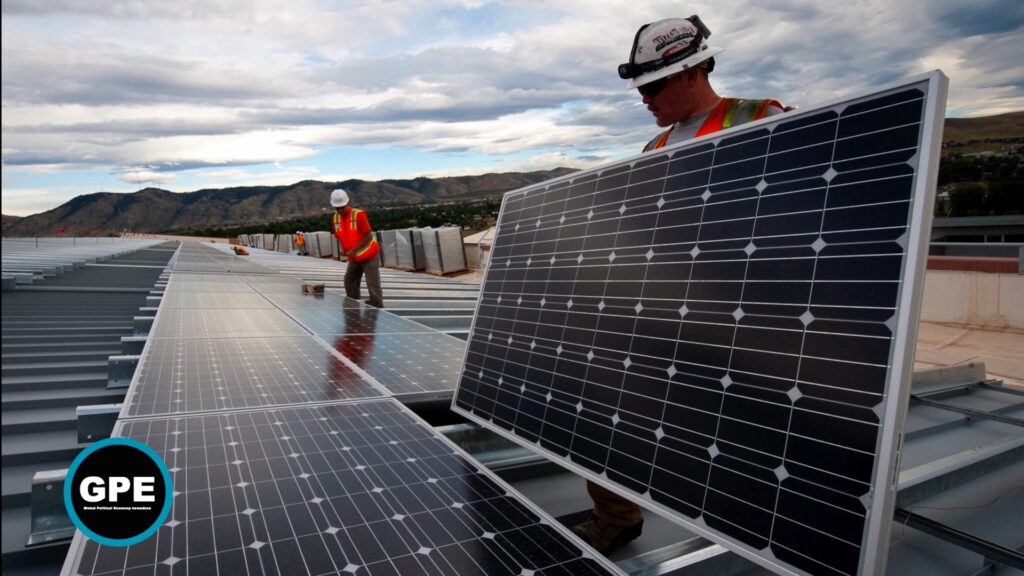
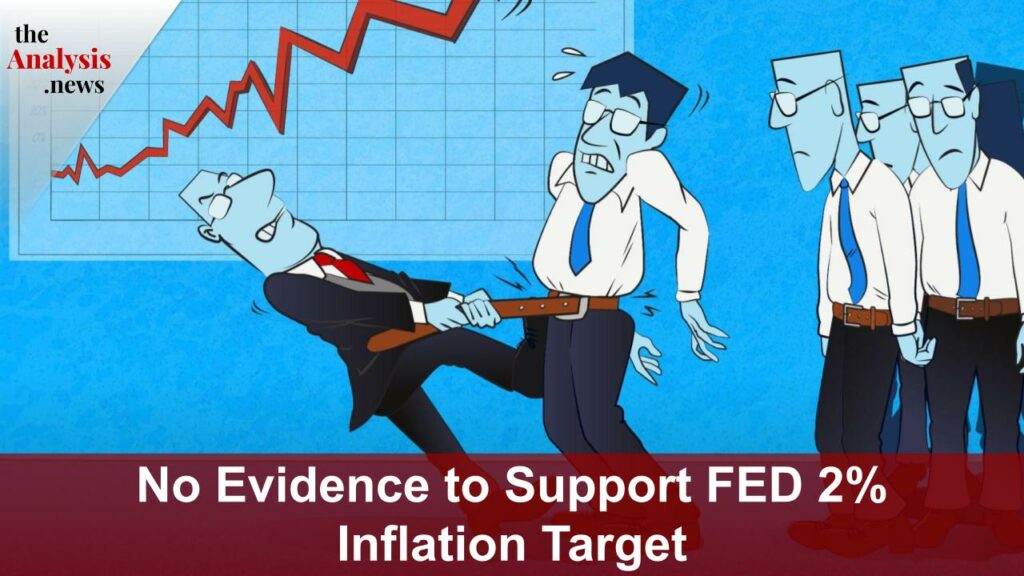

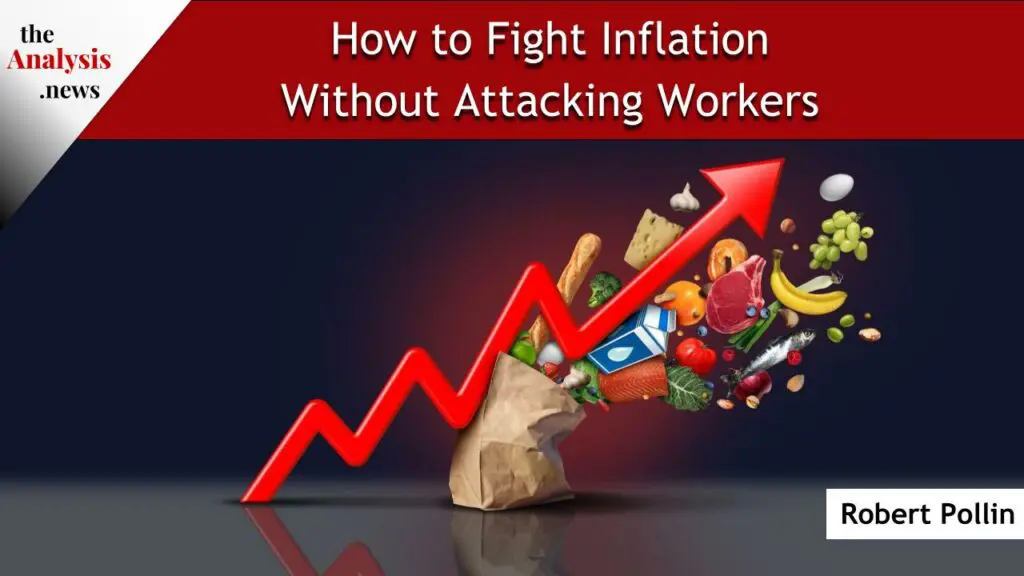
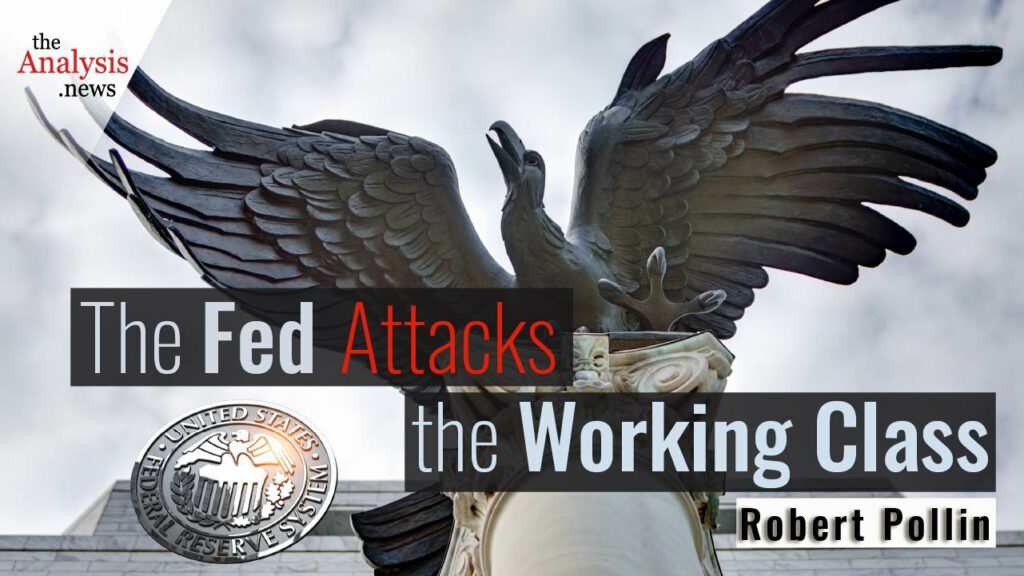
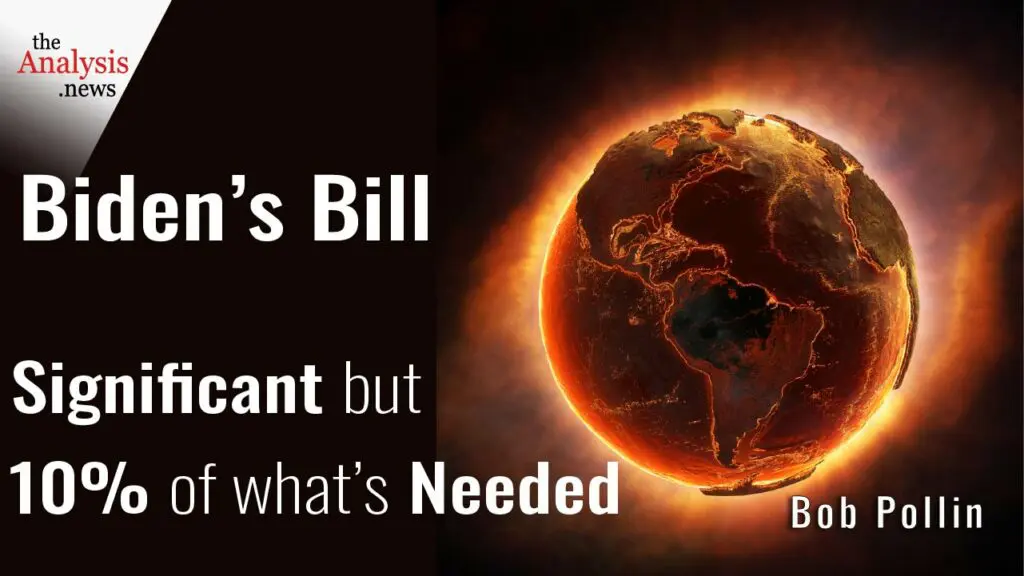
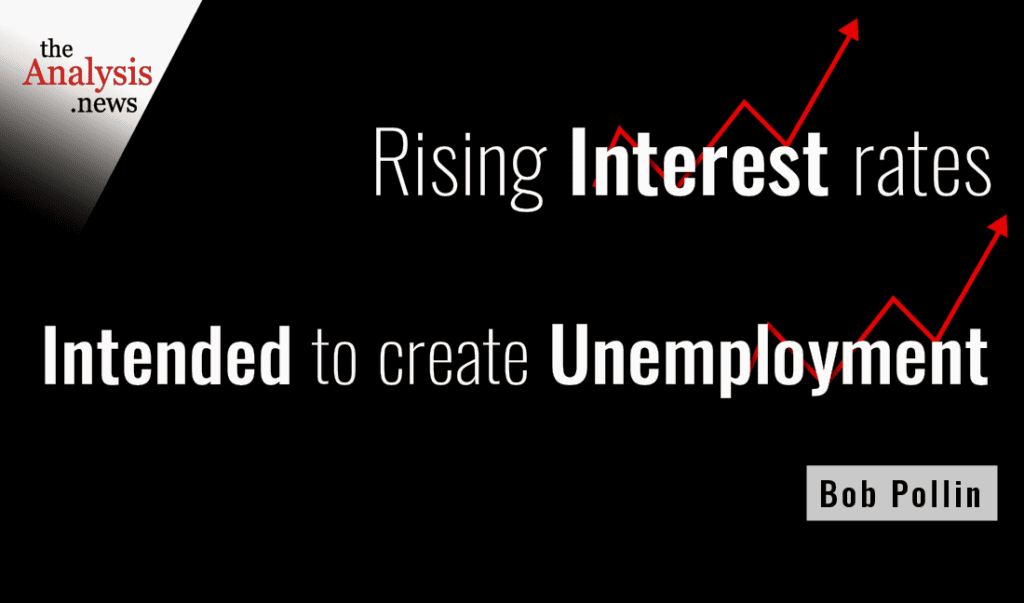



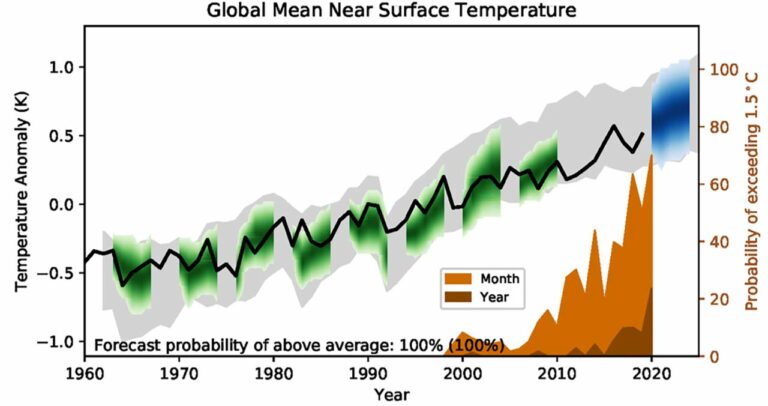
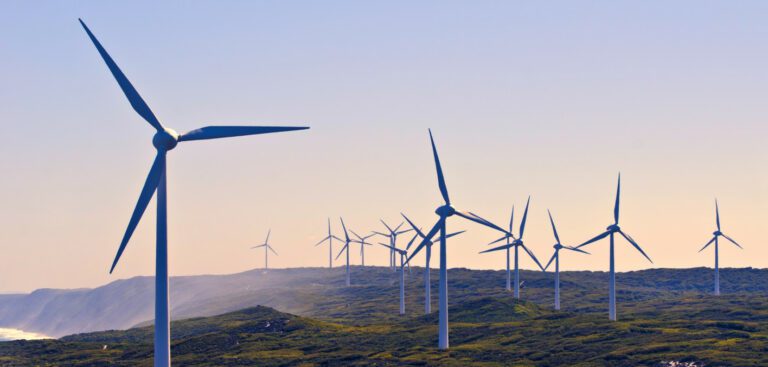
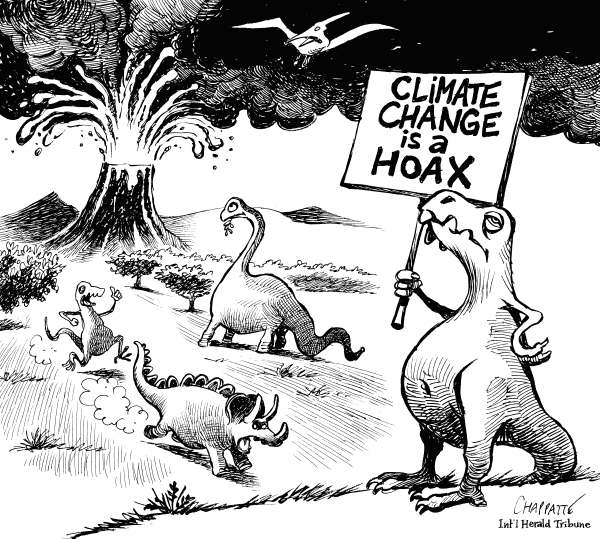
Dear Mr Rubin P. Diehl: You wrote, “Henry Kissinger is still right …”, and “stupid” did follow his advice and use military force and its threat to protect US access to oil. Henry Ass Kissinger doesn’t get full credit because his advice was not original. The same advice was given earlier, in 1953, to a “stupid”, when the Dulles brothers persuaded “Ike” to overturn the first and last democratic Republic that Iran ever had (to this date), in order to keep Iranian oil in British and US hands. We can give the Ass full credit for installing Pinochet in Chile in 1973, and for many other international crimes in the last 72 years. In the years since Ford, beginning with Carter/Reagan, clearly “still right” and a succession of “stupids” have worked together to bring our country into the spiral we now descend. That these principals belong together has been demonstrated by none other than the Nobel Peace Prize Committee, a Norwegian collection of “stupids” from the country known worldwide for its sardines and one herring named Jens Stoltenberg, a “never right”. Have a nice day!
How to dampen inflation is very simple. I notice than none on the left have suggested the obvious start. Why not! Maybe they are fearful of losing influence by suggesting what would cause unemployment in the industry most encouraged in the USA: making the tools of death.
The budget, this year, for the military and the associated “security” apparatus exceeds a trillion dollars. Cut it! Not by 5 or 10%, not by 20 or 30%! Cut it down by 90%, and give most of it to the Coast Guard. Throw all those people out of their jobs and create jobs that would produce consumer goods! Force the outsourced to come back, surrender their citizenship, and seize their assets!
If the Supreme Court cries “unconstitutional”, tell the judges to take Marbury v. Madison and stick it! They are no longer in charge of the Constitution!
Henry Kissinger is still right, after nearly half a century: “IT’S THE OIL, STUPID!”
Most of the US military budget goes to the task of ensuring the control of oil sources around the world. Just look at a map with the location of all US military bases around the globe versus the location of oil reserves.
Yes, Prof Pollin, but first we must apply the Saudi punishment to the assortment of thieves and prostitutes who make up the vast majority of our three branches of government. There is also the most criminal private institution in world history, worse than all the churches combined: the US Federal Reserve Bank. Full of thieves, from the Chair and FOMC to those at the regional Tables. I don’t really recall what the Saudis do to disfavored prostitutes, but thieves get their hands chopped off. Seems fair to me!
Once the chopping fun has ended, we should have to fix the system that put these scum in power.
Then we would have a chance of dealing with the fossil fuel industry. Instead of nationalizing it, fossilizing it would be more helpful to the mitigation global roasting, if still possible.
Nationalization, making an activity a part of government, seems only to perpetuate it. I am willing to try, but first let’s do some chopping!